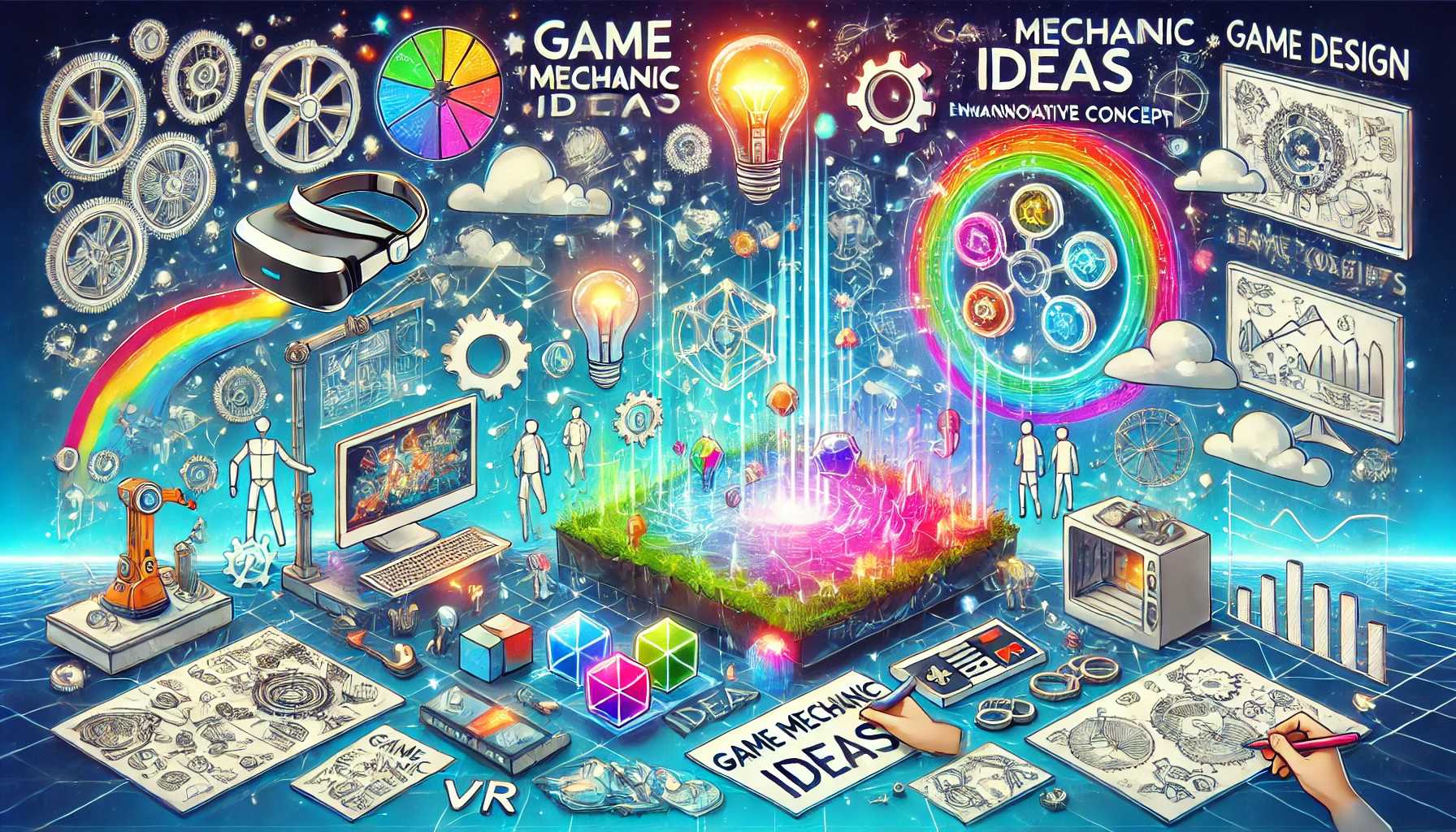The success of a game often hinges on its mechanics—the rules and systems that govern how players interact with the game world. Innovative game mechanics can make gameplay more engaging, challenging, and enjoyable, setting a game apart in a crowded market. Whether you're a game developer or an enthusiast looking for inspiration, here are some creative game mechanic ideas to enhance gameplay:
1. Time Manipulation
Time manipulation mechanics allow players to control the flow of time, adding layers of strategy and puzzle-solving. Games like Braid and Prince of Persia: The Sands of Time utilize time reversal to undo mistakes, solve puzzles, and explore alternate timelines. Incorporating mechanics such as pausing, slowing down, or fast-forwarding time can create unique gameplay experiences and challenges.
2. Dynamic Environment Interaction
Dynamic environment interaction involves creating game worlds that respond to player actions in real-time. This can include destructible environments, changing weather conditions, and interactive objects. Games like Minecraft and The Legend of Zelda: Breath of the Wild excel in this area, allowing players to manipulate their surroundings to solve puzzles, navigate obstacles, and create new paths.
3. Procedural Generation
Procedural generation uses algorithms to create game content dynamically, ensuring each playthrough is unique. This mechanic is prevalent in games like Rogue Legacy and No Man's Sky, where levels, landscapes, and even story elements are generated procedurally. This keeps the game fresh and replayable, offering endless possibilities and challenges.
4. Moral Choices and Consequences
Incorporating moral choices and their consequences can add depth and replayability to a game. Players make decisions that affect the game world, characters, and story outcome. Games like Mass Effect and The Witcher 3: Wild Hunt excel at this, presenting players with morally complex situations that influence the narrative and character development, creating a more immersive and personal experience.
5. Resource Management
Resource management mechanics challenge players to allocate limited resources effectively to achieve goals. This can include managing supplies, balancing economies, and optimizing production. Games like Stardew Valley and Oxygen Not Included engage players with strategic decision-making, requiring careful planning and prioritization to succeed.
6. Character Progression and Skill Trees
Character progression and skill trees provide players with a sense of growth and customization. By earning experience points and unlocking new abilities, players can tailor their characters to suit their playstyle. Games like Diablo III and Borderlands utilize intricate skill trees and progression systems, encouraging players to experiment with different builds and strategies.
7. Cooperative Gameplay
Cooperative gameplay mechanics encourage players to work together towards a common goal. This can include shared objectives, synchronized actions, and team-based challenges. Games like Overcooked! and Left 4 Dead highlight the importance of communication and teamwork, fostering social interaction and collaboration among players.
8. Non-linear Storytelling
Non-linear storytelling allows players to explore narratives at their own pace, making choices that affect the story's progression and outcome. Games like The Elder Scrolls V: Skyrim and Detroit: Become Human offer branching storylines and multiple endings, providing a personalized and immersive storytelling experience.
9. Physics-based Puzzles
Physics-based puzzles leverage real-world physics principles to create engaging challenges. Players must manipulate objects, use momentum, and solve puzzles using realistic mechanics. Games like Portal and Human: Fall Flat utilize physics-based puzzles to create innovative and entertaining gameplay experiences that require creative thinking and problem-solving skills.
10. AI Companions
AI companions can enhance gameplay by providing assistance, companionship, and narrative depth. These companions can help with combat, solve puzzles, and interact with the player in meaningful ways. Games like The Last of Us and Bioshock Infinite feature AI companions that enrich the story and gameplay, creating a more immersive and emotionally resonant experience.
11. Stealth Mechanics
Stealth mechanics emphasize avoiding detection and strategically navigating environments. Players can use cover, disguise, and silence to achieve objectives without direct confrontation. Games like Metal Gear Solid and Hitman excel in this genre, offering tension-filled gameplay that rewards patience, planning, and precision.
12. Crafting and Customization
Crafting and customization mechanics allow players to create and personalize items, weapons, and structures. This adds a layer of creativity and ownership to the gameplay experience. Games like Fallout 4 and Terraria feature extensive crafting systems, enabling players to gather resources and craft unique items that suit their playstyle.
13. Survival Mechanics
Survival mechanics challenge players to manage their character's health, hunger, and resources in a hostile environment. This adds tension and urgency to gameplay, requiring careful planning and adaptability. Games like Don't Starve and Subnautica immerse players in survival scenarios where every decision can mean the difference between life and death.
14. Dialogue Systems
Dialogue systems allow players to interact with NPCs and influence the game's story through conversations. Choices in dialogue can affect relationships, unlock new quests, and alter the narrative. Games like Dragon Age: Inquisition and Fallout: New Vegas feature robust dialogue systems that provide depth and replayability, making player choices impactful and meaningful.
15. Innovative Combat Systems
Innovative combat systems can revitalize traditional gameplay by introducing unique mechanics and challenges. This can include rhythm-based combat, tactical turn-based systems, and real-time strategy elements. Games like Dark Souls and Transistor offer distinct combat mechanics that require skill, strategy, and timing, creating memorable and engaging combat experiences.
Creative Mechanics: Innovating Game Design for Unforgettable Experiences
The Relationship Between Video Games and Cinema: A Cinematic Journey Through Interactive Worlds
Conclusion
Incorporating innovative game mechanics can significantly enhance gameplay, offering players new challenges, experiences, and ways to interact with the game world. Whether you're developing a new game or looking to add fresh elements to an existing project, these game mechanic ideas can inspire creativity and elevate your game's appeal.
By experimenting with time manipulation, dynamic environments, procedural generation, moral choices, and other unique mechanics, you can create engaging and immersive gameplay experiences that captivate players and stand out in the competitive gaming industry. So, embrace these ideas and let your imagination run wild as you design the next great game.
